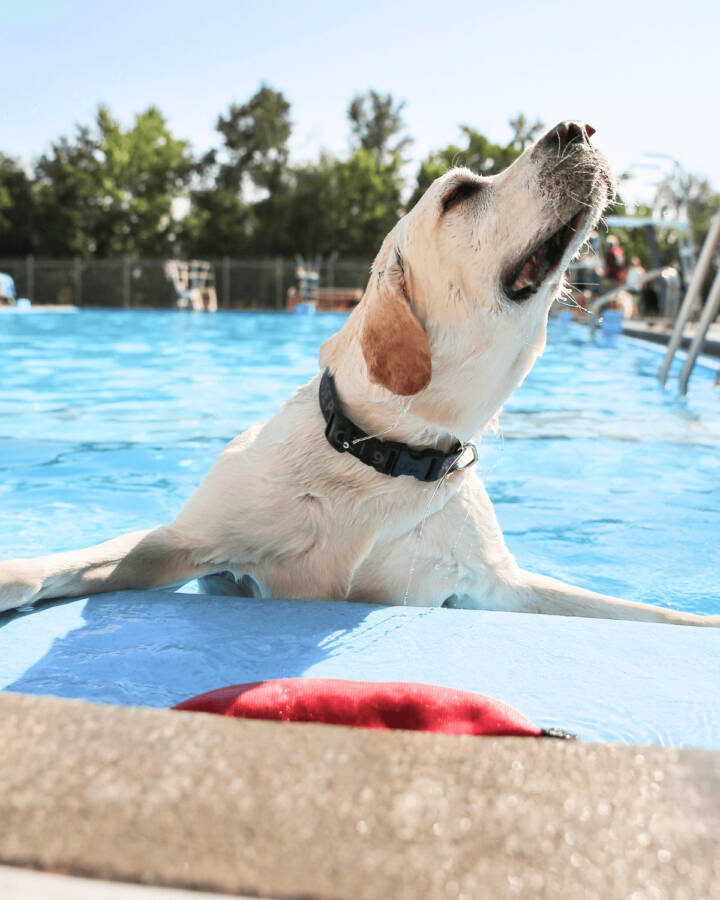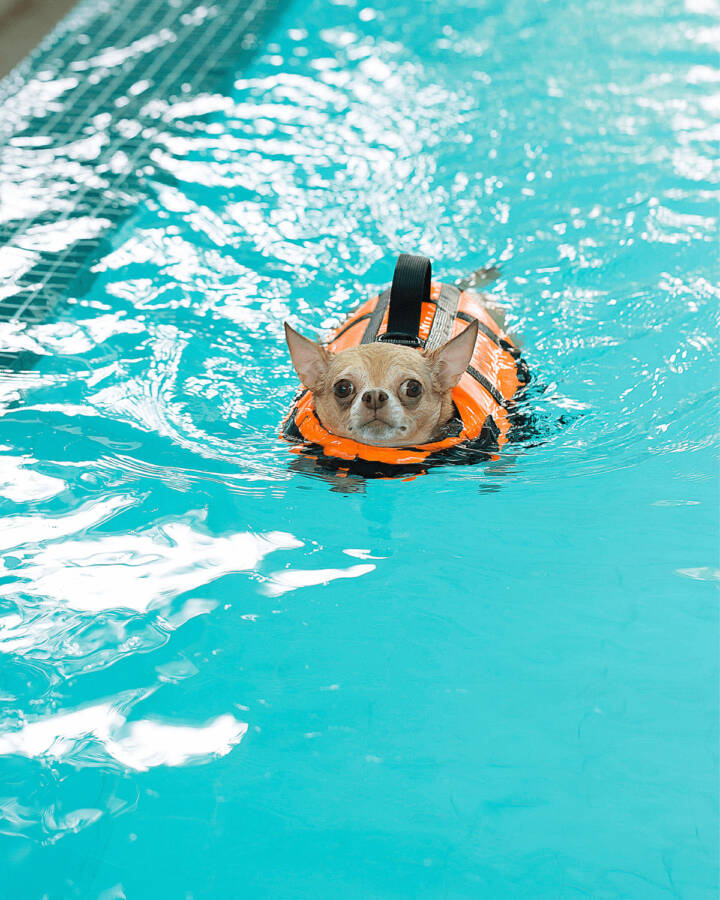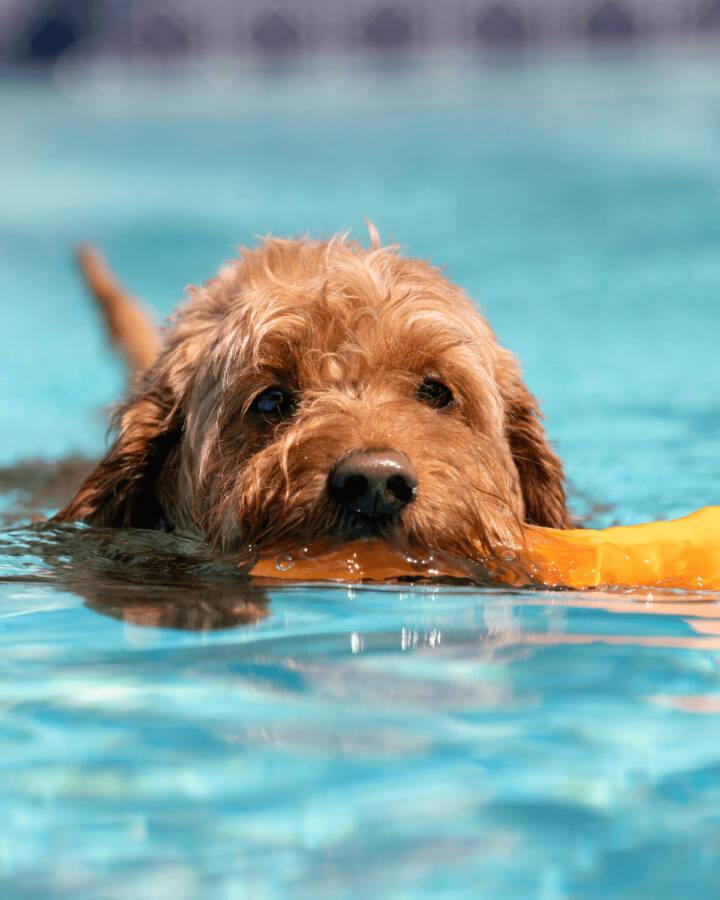Summer is in full swing, and with the rising temperatures, many of us turn to pools and water activities to beat the heat. While enjoying the pool with our furry companions can be delightful, it’s crucial to be aware of the potential dangers and take necessary precautions to ensure the safety of our beloved pets.
In this blog post, we will explore the hazards posed by pools, essential safety measures to undertake, and why it’s vital to remain vigilant around water this summer. Additionally, we’ll delve into the effects of different pool chemicals, the distinction between saltwater and freshwater, and how common summertime products can impact our pets.

Dangers Posed by Pools
Pools can present various risks to dogs, especially if they are left unattended or unsupervised. Some of the primary dangers include:
Drowning: Dogs, particularly those who are not strong swimmers or have limited swimming experience, can quickly find themselves in distress or overwhelmed in the water. It’s crucial to remember that not all dogs are natural swimmers, and even those who are strong swimmers may become exhausted or panic in certain situations.
Slippery Surfaces: Pool areas often have slippery surfaces, such as tiles or concrete, which can cause dogs to lose their footing and potentially injure themselves.
Chemical Exposure: Pool chemicals such as chlorine and other disinfectants are necessary for maintaining water quality but can be harmful if ingested by dogs. Additionally, the improper storage or handling of these chemicals can pose risks.
Saltwater vs. Freshwater: While both saltwater and freshwater pools have their benefits, it’s important to note that excessive exposure to saltwater can cause dehydration in dogs. Freshwater pools may contain chemicals like chlorine, which can irritate a dog’s skin, eyes, and nose.
"It's highly recommended to have a ramp for your furry friends to get out if they accidentally fall in when no one is home. Also, consider fencing your pool for additional safety." -SPCA-NN Veterinarians
Precautions to Take
To ensure the safety of our furry friends around swimming pools, it’s essential to follow these precautionary measures.
Supervision: Never leave your dog unattended near a pool. Always keep a watchful eye on them and ensure they have a safe exit from the water.
Pool Fencing and Barriers: Install a sturdy fence around the pool area, ideally with a self-latching gate, to prevent dogs (or humans) from accessing the pool unsupervised. Consider using pool alarms that can alert you if someone or something enters the water.
Swimming Lessons: Not all dogs are born swimmers, so it’s a good idea to enroll them in swimming lessons, particularly if they’ll be around water frequently. Proper training can boost their confidence and swimming skills.
Teach Pool Exit: Train your dog to know where the pool exit is by using visual cues or a designated spot. This will help them find their way out of the water if they accidentally fall in.
Life Jackets: For dogs who struggle with swimming or have limited mobility, fitting them with a well-fitting life jacket can provide an added layer of safety and buoyancy.

"Do not let your dog drink too much water. Excessive water intake can cause hyponatremia (low sodium) which causes brain hernia and can lead to death." -SPCA-NN Veterinarians

Awareness of Summertime Products Around the Pool
During the summer months, certain products like sunscreen, bug spray, and alcohol become more prevalent. It’s crucial to keep these items away from your pets, as they can have adverse effects.
Sunscreen: Some sunscreen products contain zinc oxide, which can be toxic if ingested by dogs. Avoid applying sunscreen to areas of your dog’s body they can easily reach, and choose pet-safe alternatives when necessary.
Bug Spray: Insect repellents that contain DEET can be harmful to dogs. Keep your dog away from areas where you’ve sprayed bug repellent, and use pet-safe alternatives instead.
Alcohol: Summer gatherings around the pool often involve alcoholic beverages, and it’s essential to keep them out of reach from pets. Alcohol ingestion can lead to serious health complications for dogs, including intoxication, vomiting, loss of coordination, and even coma.
What can I do to help protect my pets?
As the summer heat beckons us to enjoy the pool and water activities, it’s crucial to prioritize the safety of our furry friends. By being aware of the potential dangers posed by pools, taking necessary precautions, and avoiding exposure to harmful chemicals and common summer products, we can help ensure our dogs have a safer and more enjoyable summer. Remember, responsible pet ownership includes providing a secure environment for our beloved companions, both on land and in the water!

